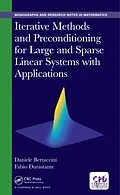This book describes, in a basic way, the most useful and effective iterative solvers and appropriate preconditioning techniques for some of the most important classes of large and sparse linear systems.
The solution of large and sparse linear systems is the most time-consuming part for most of the scientific computing simulations. Indeed, mathematical models become more and more accurate by including a greater volume of data, but this requires the solution of larger and harder algebraic systems. In recent years, research has focused on the efficient solution of large sparse and/or structured systems generated by the discretization of numerical models by using iterative solvers.
Autorentext
Daniele Bertaccini, Ph.D is currently a professor at Università di Roma Tor Vergata. Fabio Durastante, Ph.D is a postdoctoral researcher. Their research interests are mainly the large and sparse and/or structured linear systems arising in the numerical solution of partial and fractional differential equations with their applications in fluid dynamics, optimization and imaging.
Zusammenfassung
Harnessing the power of technology is one of the key measures of effective leadership. Leadership Strategies in the Age of Big Data, Algorithms, and Analytics will help leaders think and act like strategists to maintain a leading-edge competitive advantage. Written by a leading expert in the field, this book provides new insights on how to successfully transition companies by aligning an organization's culture to accept the benefits of digital technology.The author emphasizes the importance of creating a team spirit with employees to embrace the digital age and develop strategic business plans that pinpoint new markets for growth, strengthen customer relationships, and develop competitive strategies. Understanding how to deal with inconsistencies when facts generated by data analytics disagree with your own experience, intuition, and knowledge of the competitive situation is key to successful leadership.
Inhalt
1 Introduction and Motivations
1.1 Notes on error analysis
1.2 Sparse matrices
1.3 On parallel computing and hardware acceleration
2 Some iterative algorithms for linear systems
2.1 Iterative algorithms and simple one-dimensional techniques
2.2 Krylov subspace algorithms, orthogonal projections: CG and GMRES
2.3 Krylov subspace algorithms, oblique projections: BiCG, QMR, CGS, BiCGstab, BiCGstab
2.4 Which Krylov method should I use?
3 General purpose preconditioning strategies
3.1 Generalities on preconditioning
3.2 Krylov iterative methods for preconditioned iterations
3.3 On Jacobi, SOR, and SSOR preconditioners
3.4 Incomplete factorizations preconditioners
3.5 Approximate Inverse Preconditioners
3.6 Preconditioning sequences of linear systems
3.7 Parallelizing preconditioners and available software
3.8 Which general purpose preconditioner should I use?
4 Preconditioners for some structured linear systems
4.1 Toeplitz and block Toeplitz systems
4.2 Notes on multigrid preconditioning
4.3 Complex symmetric systems
4.4 Saddle point systems
Appendix A: A Review of Numerical Linear Algebra
A.1 Vector and matrix norms
A.2 Eigenvalues and singular values
Appendix B: Data sets and software codes
B.1 Test matrices and data sets
B.2 Numerical Linear Algebra software
